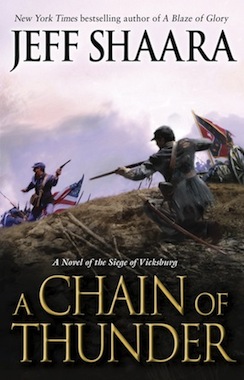Review: A Chain of Thunder by Jeff Shaara
 I wanted to like Jeff Shaara’s latest Civil War novel, A Chain of Thunder: A Novel of the Siege of Vicksburg. Really, I did. It seems like I say that every time I pick one up. After all, I very much appreciate all Shaara has done to generate broad interest in the Civil War, eclipsed in the modern era only by Ken Burns. Also, on the couple of occasions I’ve met him, I’ve found him to be a really nice guy.
I wanted to like Jeff Shaara’s latest Civil War novel, A Chain of Thunder: A Novel of the Siege of Vicksburg. Really, I did. It seems like I say that every time I pick one up. After all, I very much appreciate all Shaara has done to generate broad interest in the Civil War, eclipsed in the modern era only by Ken Burns. Also, on the couple of occasions I’ve met him, I’ve found him to be a really nice guy.
But at 562 pages, A Chain of Thunder is easily 150 pages too long. Characters obsess and get angsty, obsess and get angsty, obsess and get angsty—and it never seems to add up to much. Sure, the novel covers a lot of ground—most of middle Mississippi as Ulysses S. Grant marches inland and then doubles back in his envelopment of Vicksburg—but it hardly ever seems to go anywhere. Like any siege, the book just hunkers down and stays there. By the time Grant captured the Gibraltar of the West, I felt far more relief than excitement.
One of the book’s main characters is Union Maj. Gen. William T. Sherman, whose role in the book can largely be summed up thus: Does Grant like me? Of course Grant likes me. But if he likes me, why does he seem to be hanging over my shoulder? Doesn’t he trust me? Oh, it’s because he likes me and enjoys my company. But does he like me? Of course he likes me…. There’s about a hundred pages of that even as Sherman’s men march and fight and win.
The main character in gray is Confederate Lt. Gen. John C. Pemberton, in over his depth at the head of an army and caught between the conflicting orders of his immediate superior, Gen. Joseph Johnston, and Confederate President Jefferson Davis. Pemberton offers Shaara the best chance at a truly interesting character, not only because of his rock-and-a-hard-place position but also because of Pemberton’s Pennsylvania roots. He fought for the Confederacy out of loyalty to his wife. “I will not betray my precious Pattie,” he vows righteously to himself.
And so goes Pemberton’s ongoing angsty refrain: Why don’t the people of the South trust me? Why can’t I get anyone’s respect? Why can’t I get anyone to obey my orders? punctuated by Whose orders should I follow, my president’s or my commanders? I am in such a hard position. Woe is me.
In Shaara’s hands, Pemberton is prone to the kind of long monologues that evil geniuses and super villains make, giving the good guy the opportunity to learn the plan AND make an escape—if they don’t die of boredom. Pemberton’s monologuing goes on for single paragraphs that stretch the entire length of entire pages. I’d excerpt one here just to show you, but I’d put you to sleep. (See page 108 of the book for an example if you don’t believe me. In the meantime, if you’d like to read something interesting about Pemberton, try Phill Greenwalt’s post from October.)
Shaara does add a civilian perspective to this novel, that of Lucy Spence. Civilians “suffered mightily,” he writes, and their tenacity “is a part of this story that cannot go overlooked.” In that, Shaara succeeds. His finest writing in the book comes from Spence’s perspective, and those portions of the book alone make the book worth reading.
Shaara also does a surprisingly good job of recounting troop movements and battle summaries. Several maps help illustrate events, but Shaara’s writing is solid and his accounts are clear. While he’s not writing with the stylistic flourish of, say, a Shelby Foote, his accounts are certainly more interesting than a typical history textbook.
The Western Theater usually gets overshadowed by events in the east, and the fall of Vicksburg usually gets overshadowed by events in Gettysburg, so Shaara’s book fills a void. I’m glad he’s chosen to pay some attention to the crucial events that took place along the Mississippi just as I’m glad that his most recent trilogy is giving due to Grant’s rise. I just wish A Chain of Thunder didn’t read like the siege of Vicksburg in real time.
I would venture to say that every one who reads this blog reads a LOT of Civil War books. I know I do. Reading Civil War books is a lot like being a Civil War soldier–a lot of marching and sitting in camp, punctuated by a horrific battle and some dysentery. But it is what we do.
Thank goodness for Shelby Foote!
This might’ve been a case of dysentery–it ran on and on.
Actually, this review sounds like the book realistically presents the two major flaws that plagued many of the battles in the Western Theatre of the war…Grant’s problem re: alcoholism, and sherman’s life-long struggle with mental illness. Apparently, this book places the reader right dab in the middle of both of these issues, so how could it “read” quickly and smoothly? The subject matter doesn’t permit it.
I wish I could say you’re right, eshonk. A more able writer might’ve been able to do some fascinating explorations into both of those issues. In this case, it wasn’t an artful examination of either of those things; it was poorly crafted characterization, plain and simple. Good writing shouldn’t plod, regardless of the topic.
Let’s hope Ron Maxwell doesn’t get a hold of this….
I second that!